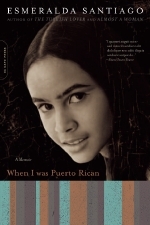
When I Was Puerto Rican
Merloyd Lawrence
فرمت کتاب
ebook
تاریخ انتشار
2006
Lexile Score
1020
Reading Level
4-5
ATOS
6
Interest Level
9-12(UG)
نویسنده
Esmeralda Santiagoناشر
Hachette Booksشابک
9780786736867
کتاب های مرتبط
- اطلاعات
- نقد و بررسی
- دیدگاه کاربران
نقد و بررسی

August 30, 1993
``Our home was a giant version of the lard cans used to haul water from the public fountain. Its windows and doors were also metal, and as we stepped in, I touched the wall and burned my fingers.'' So begins this involving memoir of family life, poverty, ambition, island countryside and Brooklyn, N.Y., cityscape by the eldest of 11 Puerto Rican children. Santiago attended Harvard on a scholarship and she is now president of her own film company. She relates with humor and affection a childhood punctuated by the birth of a sibling almost every year, by the fights between her parents--both of whom she loved--over her father's refusal to marry her mother, and by the many times her mother would leave him, always to relent--until the final move to Brooklyn, where the author's grandmother lived. Shocked by the cement-ugliness and the crime-ridden Brooklyn streets, Santiago determined to get out. Although her English was poor, she was a good student who attracted the interest of her teachers. They helped her audition for the elite New York High School of Performing Arts--and she was on her way. Santiago's portraits are clear-sighted, the Puerto Rican ambience rich, and her immigrant experience is artfully and movingly told. One wishes, however, that she had been specific about the chronology of events.

February 1, 1994
YA-Esmerelda and her seven siblings live in a corrugated metal shack in Puerto Rico. She is uprooted as a result of poverty and her parents' quarreling and suffers blows to her ego from their expectations of her. The girl goes to New York, where her grandmother lives, and must rely on her intelligence and talents to help her survive in an alien world in which being Puerto Rican is not advantageous. Her story rings true and will be an inspiration to YAs forced to make their own way in a sometimes hostile environment.-Ginny Ryder, Lee High School, Fairfax County, VA

September 15, 1993
As president of her own film company, Santiago has won praise for her writing and producing. In this, her first book, she tells of her childhood in Puerto Rico in the 1950s and of her family's move to New York when she was 13. Her rich prose recreates the tropical splendor of Puerto Rico, the harsh conflicts between her parents, and the squalor of Brooklyn. While she shares unique personal experiences, Santiago also expresses the universality of growing up. Her memoir ends dramatically with her audition for New York's High School for Performing Arts. A poignant look at a girl's coming of age and taking control of her own destiny, Santiago's story reflects that of Puerto Rico: to be a part of the United States, yet distinct and somehow detached. Recommended.-- Gwen Gregory, U.S. Courts Lib., Phoenix
Copyright 1993 Library Journal, LLC Used with permission.

October 1, 1993
Many individuals who grew up in the barrios, whether of Puerto Rico, Brooklyn, or elsewhere, may have found life to be one long, continuous struggle for survival. In Santiago's memoir, she lovingly recalls her own passage through childhood, when her mother moved her children away from their father and the humble dwelling they all shared in the country outside San Juan to a Brooklyn apartment adjoining the projects. For Santiago, who at age 14 was an exceptional student but still spoke little English, the ticket out of the cycle of poverty was acceptance to New York City's High School of Performing Arts. At once heart-wrenching and remarkably inspirational, this lyrical account depicts rural life in Puerto Rico amid the hardships and tensions of everyday life and Santiago's awakening as a young woman, who, although startled by culture shock, valiantly confronted New York head-on. When in the epilogue Santiago refers to her studies at Harvard, it is both a stirring and poignant reminder of the capacities of the human spirit. ((Reviewed Oct. 1, 1993))(Reprinted with permission of Booklist, copyright 1993, American Library Association.)

























دیدگاه کاربران